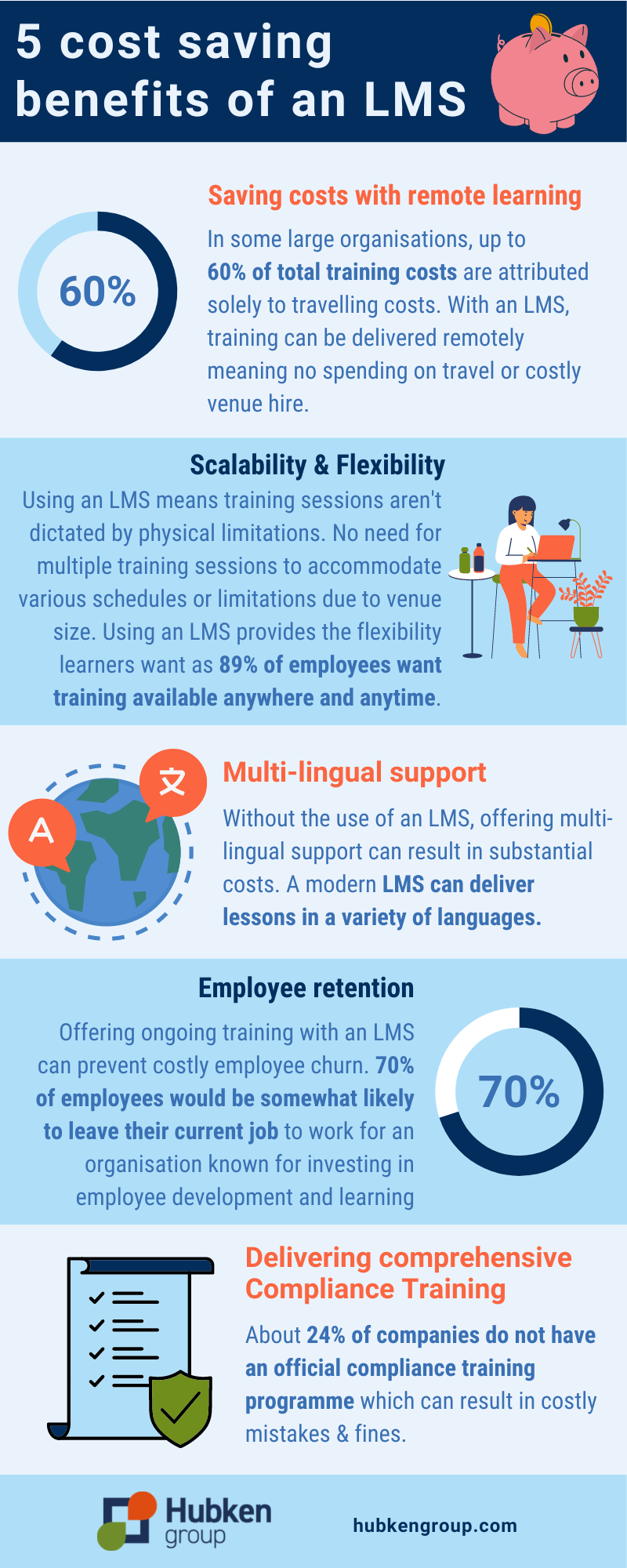If you're looking to invest in an LMS, one of the best ways to evaluate the overall ROI is to look at the ways this powerful e-learning platform can actually save on costs. Offline or face to face training can be expensive in a number of ways but relying on LMS technology can significantly reduce L&D expenditure. Read through our handy infographic to learn about some of the cost saving benefits of implementing an LMS.

Remote learning
Traditional learning methods in a business or teaching environment usually consist of face-to-face lecture-style training days or classrooms. When you’re considering the cost of a Learning Management System (LMS), look at the cost of a traditional training day, paying to hire out a room/rooms, travel, external trainers, refreshments, printed materials etc.
In some large organisations, up to 60% of total training costs are attributed solely to travelling costs. With an LMS, training can be delivered remotely meaning no spending on travel or costly venue hire.
Scalability and Flexibility
Using an LMS means training sessions aren't dictated by physical limitations. These physical limitations often mean organisations have to host multiple training sessions or, in worst case scenarios, exclude groups of people who weren’t deemed as essential, to save on expenses.
Using an LMS for teaching or training days means you can have an unlimited amount of users (depending on your plan) and multiple training days at no additional cost. Using an LMS instead means no extra costs and logistical issues don’t need to dictate the length of a training day. Indeed, training can often fit in and around an employee’s usual working day, fitting in an hour here or there rather than using a full day, meaning significantly less disruption to a working week. An LMS provides the flexibility learners want as 89% of employees want training available anywhere and anytime.
Multi-lingual support
If your organisation consists of international users who would benefit from learning in their native language or are working from branches in various countries, then offering training/teaching in multiple languages benefits the learner and makes learning more effective.
Without the use of an LMS, offering multi-lingual support can result in substantial costs as you may have to pay for a translator to accurately translate the content or a bi-lingual teacher to deliver the lessons.
However, a modern LMS can deliver lessons in a variety of languages – a feature inherent in the best LMS solutions. As long as the planning and setup is done correctly with the appropriate language packs installed, you will have a learning platform that can teach your learners in their native tongue. This ensures that your business is both saving time and money whilst delivering highly engaging content that optimises user experience by localising their experience.
Employee retention
Offering a comprehensive onboarding program for new starters sets the tone for their future employment. If they start their new role feeling properly equipped and supported, the chances are they will feel like they made the right choice. In fact, offering ongoing training with an LMS can prevent costly employee churn. 70% of employees would be somewhat likely to leave their current job to work for an organisation known for investing in employee development and learning
Delivering this type of comprehensive teaching can be both time-consuming and expensive. However, using an LMS makes course creation and distribution so much easier and once created it requires no additional input from managers/trainers as it’s simply a case of the user logging on and completing the training autonomously.
Compliance training
A continuous concern for organisations in many sectors is delivering mandatory compliance training. About 24% of companies do not have an official compliance training programme which can result in detrimental effects on the day-to-day running of a business or organisation often resulting in considerable fines to the organisation. Using an LMS as your chosen delivery method for this essential training is an invaluable solution, moving away from what is often a very manual process, laden with mistakes.
If compliance regulations need to be met by a specific date, an LMS offers significant advantages as large numbers of staff can complete training at the same time through a fast and cost-effective online course delivery. Additionally, end of course tests can be automatically assigned, certifications granted, and audit trails easily compiled, easily highlighting those who have failed and need extended training from those who have fully met the compliance targets.
LMS Pricing
Hopefully by now you'll have a better understanding of some of the cost saving benefits of using an LMS to achieve your L&D goals. If you're just at the beginning of your LMS journey or you're looking to change your current LMS, perhaps you're wanting to find out more about the cost of implementing this e-learning platform. For advice on LMS pricing, get in touch with one of our friendly experts or read through our comprehensive Moodle and Totara pricing guides.

HubkenCore pricing for Totara and Moodle LMS
Find out more about our available solutions along with our HubkenCore package. Visit our pricing page to find the right platform for you and contact us for pricing.




